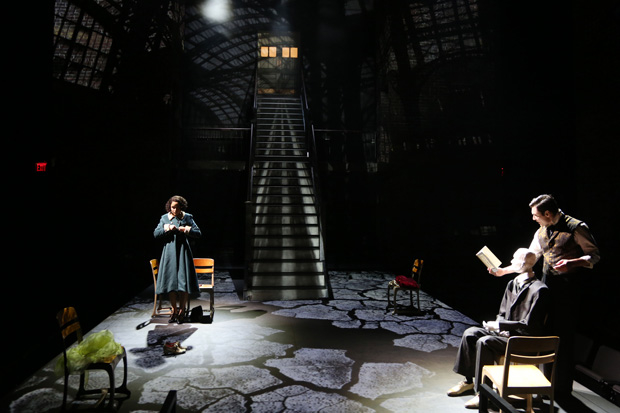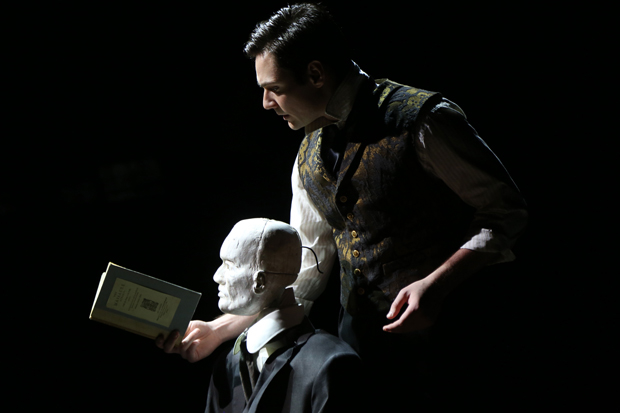He Brought Her Heart Back in a Box
Theatre for a New Audience premieres an Adrienne Kennedy play intermingling the Jim Crow South, Nazism, Christopher Marlowe, and Noël Coward.

(© Gerry Goodstein)
"Surreal" is a word often applied to Adrienne Kennedy's work. (See, for example, American Repertory Theater's introduction to her oeuvre.) It certainly suits her latest play, He Brought Her Heart Back in a Box, now making its world premiere at the Polonsky Shakespeare Center. But so does the term "real." This kaleidoscopic one-act examines the Jim Crow South, the rise of Nazism, and the connection between them.
First, the Jim Crow South. Here it's incarnated by the fictional town of Montefiore, Georgia, in 1941. Seventeen-year-old Kay attends a "colored" boarding school there. Working in a storeroom at the school is Chris, another 17-year-old and son of one of the school's founders, the local magnate Harrison Aherne. When not swooning over Kay, Chris helps his dad balance the books. Kay returns his affection and agrees to marry him, his plans to leave Montefiore for an acting career in New York City notwithstanding. Much of the play unfolds as letters between them, Chris writing from his dressing room and Kay from the colored section of a train car.
The letters aren't professions of love, though; they're musings on and recollections of dark family history. Chris wonders why his segregationist father visited Germany several years ago. Kay recounts the fallout from her mother's rape at 15 by a white man. Ashamed, her mother took off to Cincinnati after giving birth, where three weeks later she was found dead in the freight elevator of an apartment building. Was it suicide? Murder? And did Kay's father really bring her mother's heart back to Montefiore in a box, as "the colored people believe"?

(© Gerry Goodstein)
Dotting the gruesomeness are quaint excerpts from "Dear Little Cafe," sung by Chris in a New York production of the Noël Coward operetta Bitter Sweet. Less quaint, though no less arcane, are interpolated lines from Christopher Marlowe’s The Massacre at Paris. "O that / That damned villain were alive again / That we might torture him with some newfound death," cries Chris. But wait, is he acting in another New York show? Or is he giving voice to his father, embodied by a ghostly mannequin ever-present onstage? The play offers no straightforward answers to these questions.
Still, under the direction of Evan Yionoulis, the obliquity isn't off-putting — it's entrancing. Abetted by her design team, she loads the production with film noir flair. Shadows loom suddenly, and black-and-white projections — whether of train tracks or of the surface of a river where black babies got shot by nearby white landowners minutes after baptism — ripple across the stage. Sounds linger, as when a climactic gunshot rings in the air long after its damage has been done. In this nightmarish atmosphere, the script's nonlinearity feels at home. Details emerge drip by bloody drip, like clues in a mystery the audience is invited to solve. And even if you lose track of Kay's and Chris's family details, you can still enjoy the haunting ambience.
The acting is fittingly hypnotic. Juliana Canfield as Kay and Tom Pecinka as Chris often speak as though in a trance. Even describing her raped mother's "black and purple and crippled legs," Canfield's Kay never loses her composure. Nor, strangely, do she and Pecinka's Chris ever lose their humanity. There's warmth between them, whether meeting at the boarding school or reuniting in New York.
For all its complexity, He Brought Her Heart Back in a Box is strikingly simple in one respect: its rogues' gallery of racist Southerners and their Nazi admirers. Germany did, in fact, look to the American South as a model for racial segregation, but the parallel here is underdeveloped. The furthest it goes is in a few German houseguests' praise of Chris's grandfather, a landowner who used his power to divide the black and white people of Montefiore: "He knows the importance of making a person enter through the back door and of never addressing them as you are addressed," Chris recalls them saying. "He understands how language can be used to humiliate."
Kennedy too understands how language can be used. She and Yionoulis take different idioms — those of the South, Elizabethan drama, and 1940s films — and use them to tell a mystery story that speaks to various times and places. One of those times and places is our own: In a historical moment when race and racism crowd the American consciousness, let's hope this story proves intelligible to audiences.








